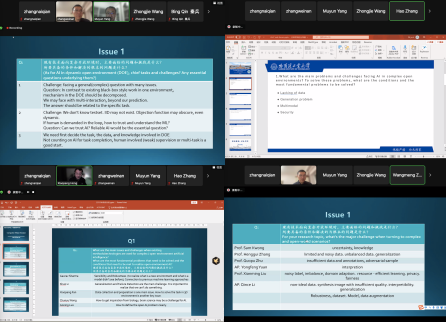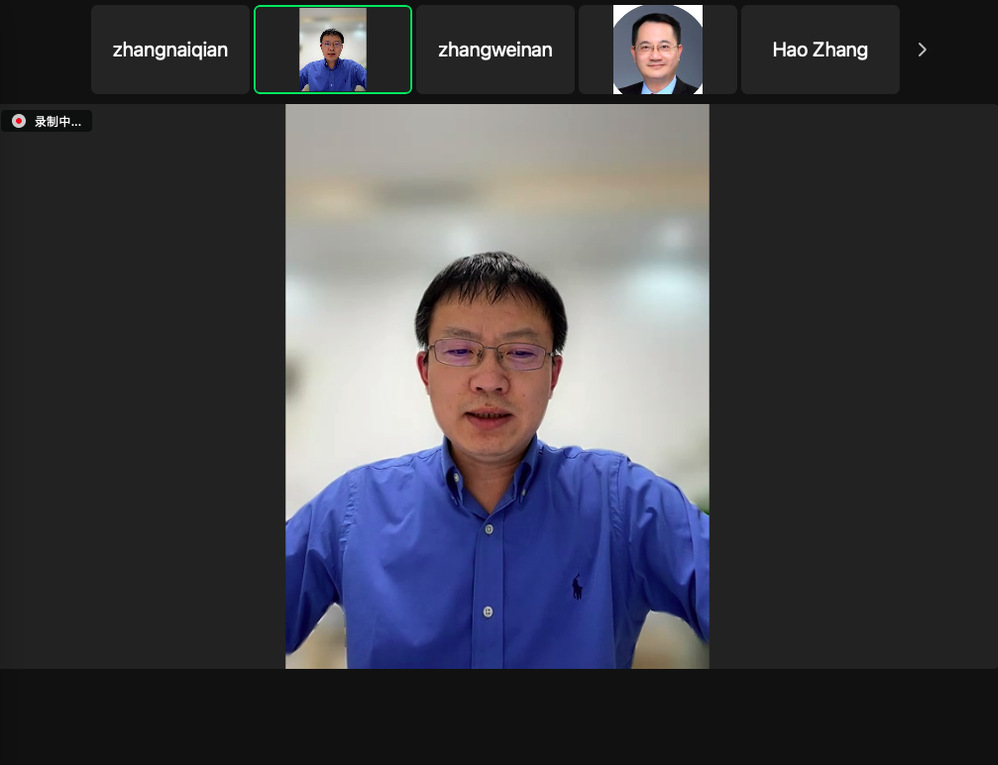On the evening of October 29 and 30, the Faculty of Computing, Harbin Institute of Technology held the International symposium on Artificial Intelligence in Complex Open Environments online. The symposium invited 11 experts and scholars from 6 countries including the United States, Canada, Australia, the United Kingdom, Switzerland and Russia with international academic influence in Natural Language Processing, Computer Vision, Machine Learning and Artificial Intelligent Internet of Things, as well as nearly 30 teachers from the Faculty of Computing. The symposium were held in two days, presided over by Professor Wu Qianqian and Associate Professor Zhang Weinan from the Faculty of Computing.
On October 29, Professor Liu Ting, Director of the Faculty of Computing, and Professor Xiong Jian, Director of the Foreign Affairs Department of the Division of International Cooperation of HIT, delivered opening speeches respectively. Liu Ting welcomed the experts at the meeting and gave a detailed introduction to the overall situation of the Faculty of Computing, especially the AI major. It is hoped that this seminar can draw some important conclusions leading to the future direction of AI of the Faculty of Computing. Xiong Jian introduced the general situation of the international cooperation of Harbin Institute of Technology, emphasized the importance of Harbin Institute of Technology to the international cooperation work, proposed the goals of the international cooperation work of HIT, and finally wished the symposium a complete success.
After the opening speech, the expert from Adelaide University in Australia made a theme report entitled Artistic Intelligence in Complex Open Environment. The expert from Tsinghua University made a theme report entitled “Collaborative&Conversational Intelligence: Progress and Beyond”. The expert from the Chinese University of Hong Kong made a thematic report entitled “Edge AI for Automotive Driving and Smart Health Systems”. The expert from the Federal Institute of Technology in Zurich, Switzerland, made a theme report entitled When the Annotator is Away, the Engineers Come to Play. The expert from Romonosov State University in Moscow, Russia made a theme report entitled “The Modern World as a Hyperspace of Realizations”.
After the reports of the five experts, the experts and scholars attending the meeting had a warm exchange and discussion on each expert's report.
On October 30, the symposium was divided into four sub symposiums: Natural Language Processing, Machine Learning, Artificial Intelligent Internet of Things, and Computer Vision. Associate Professor Yang Muyun, Professor Zuo Wangmeng, Associate Professor Zhang Hao, and Professor Hong Xiaopeng from the Faculty of Computing acted as the moderators of the sub symposium. Each sub symposium first conducted a guided speech report.
The report of Natural Language Processing sub symposium was made by the expert from the University of Montreal, Canada, entitled Is Attention All We Need For NLP in Complex Real world Applications?. After that, Professor Qin Bing, Associate Professor Zhang Weinan, Associate Professor Sun Chengjie, Associate Professor Feng Xiaocheng, Teacher Shan Lili, and Teacher Zhao Sendong made speeches respectively and put forward their views on the contents of the report, and discussed the topics set by the symposium.
The report of Machine Learning sub symposium was made entitled Machine Learning: Challenges and Opportunities by the expert from City University of Hong Kong. After that, experts from the United Kingdom, Professor Liu Xianming, Professor Zhu Guopu, Professor Yuan Yongfeng and Associate Professor Li Qince made speeches respectively, elaborated their views on the contents of the report, and held a warm discussion on the topics given by the symposium.
Experts from the University of New South Wales in Australia made a report entitled “Understanding Interactions in Open Complex Environment: Advances and Open Problems” on the Artificial Intelligent Internet of Things sub symposium. After that, the experts, Professor Liu Jie, Associate Professor Yu Haining, Associate Researcher Li Feng and others discussed their views respectively based on the report and current research work, and conducted an open discussion on the topics set up by the symposium.
The report of Computer Vision sub forum was presented by the expert from the University of Rochester in the United States, entitled “Perspectives on Artistic Intelligence in Complex and Open Environments”. After that, experts from the United States, Professor Fan Xiaopeng, Professor Jiang Junjun, Associate Professor Wang Chunyu, Associate Professor Luo Gongning and others elaborated their views on the contents of the report, and conducted detailed discussions on the four topics given by the symposium.
After the sub symposium discussions, all participating experts returned to the main symposium, and the moderators of each sub forum made a summary report based on the discussion results of each group. The four sub symposium moderators respectively summarized and elaborated the discussion results of each sub symposium on the set topics, and proposed that although faced with multiple challenges and technical difficulties in the field of artificial intelligence in complex and open environments, it is possible to achieve general intelligence at different levels (models and applications) in complex and open environments in the future through the integration of research and technology applications in specific fields.
At the end of the symposium, Professor Wang Zhongjie, Deputy Director of the Faculty of Computing, Harbin Institute of Technology, delivered a closing speech. On behalf of the Faculty of Computing, Wang Zhongjie first expressed his thanks to all the experts who participated in this symposium and delivered wonderful speeches, as well as the teachers from the Faculty of Computing who participated in this symposium. He started from the history of the artificial intelligence in the computer specialty of Harbin Institute of Technology, and focused on the development and current situation of artificial intelligence in the Faculty of Computing, as well as the achievements of international exchanges and cooperation of the Faculty of Computing in the past five years. At the same time, he pointed out the purpose and vision of this symposium with complex and open environment AI as the theme, and invited experts to participate in the symposium, hoping to have more in-depth cooperation with all experts. Wang Zhongjie hopes that all teachers of the Faculty of Computing can have in-depth discussions with experts, determine common research interests and cooperate closely.
This symposium identified key issues and cutting-edge trends in related fields by deliberating and discussing scientific and technological issues related to AI topics in complex and open environments. The symposium broadened the international vision of the faculty and students of the Faculty of Computing, Harbin Institute of Technology, laid a good foundation for the Faculty of Computing to carry out in-depth international exchanges and cooperation, and also pointed out the direction for the follow-up promotion of scientific research, talent training and discipline construction. In addition, the holding of this international symposium had further enhanced the international experts and scholars in the field of artificial intelligence to have a deeper understanding of our AI specialty and corresponding research directions, and promoted our international influence.





